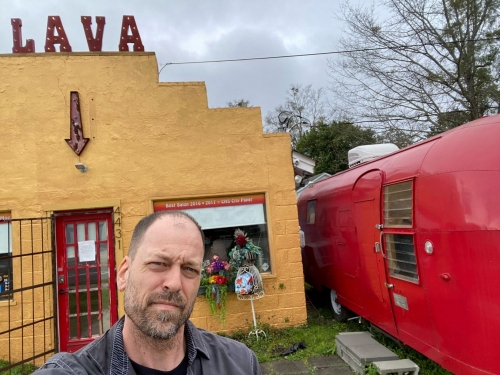Mobile Barbershops Legislation Passes Committee, Moves to House Floor
South Carolina could be on the “cutting edge,” says Rep. Pat Henegan, of a new innovation in the world of barbering.
On Wednesday, March 3, 2021, the Medical, Municipal and Military Affairs (“3M”) Committee of the South Carolina House sent H.3024 to the floor in a unanimous vote. The committee’s approval was a huge step towards the authorization of mobile barbershops in South Carolina. This bi-partisan legislation would allow the state Board of Barber Examiners to issue permits to barbers operating out of a mobile unit.
According to the proposed statute, barber shops on wheels would be subject to the same requirements as brick-and-mortar shops, but the barbers could bring their services to the customer.
Palmetto Promise Institute’s Dr. Oran Smith testified at the February 23rd Subcommittee hearing in support of the legislation, arguing that this legislation would create more opportunities to work amid the COVID-19 pandemic. “I believe we should always err on the side of making it easier to work, not harder. That’s why we at Palmetto Promise Institute think that Rep. Henegan’s H.3024 is such a godsend. With passage of this bill, one more [regulatory] barrier to work will come down.”
That’s a reference to the “Work, Justice and Quality of Life” section of PPI’s Palmetto Playbook of over 60 ideas for expanding the state economy in the wake of COVID-19.
“Not everybody can go to college, but they can be dynamite barbers.”
Palmetto Promise caught up with Rep. Pat Henegan (D-Marlboro), the lead sponsor of the bill, following Wednesday’s hearing. Rep. Henegan said that the barbers she spoke with were particularly interested in being able to serve those who may not be able to get to a barber shop, such as the homeless, elderly, disabled, and institutionalized youth. Rural areas like Marlboro lack transportation. There’s no Uber or taxis for older folks or those without a car to get a ride to a barber.
In addition, Henegan said that the legislation just makes common sense in light of the rise of mobile units in other industries. “We have mobile dentistry, mobile catering, mobile food trucks… Recently I saw a streetcar cigar lounge! All these people can do it, so why can’t [barbers]?” Rep. Henegan said, “Why can’t we endorse their dreams? I just don’t get it. Why can’t South Carolina be on the cutting edge of innovation?”
The Marlboro County Representative went on to say that it’s critical we provide more opportunities for those in industries that don’t require a four-year degree, “Not everybody can go to college, but they can be dynamite barbers.”
A Charleston salon owner has his mobile units ready to go as soon as the legislation passes
That’s great news for Geoff Richardson and his wife Noel. They own Lava Salon in North Charleston. Richardson has been fighting for mobile barbershops since the 2008 financial disaster, working with then-sponsor Rep. Leon Stavrinakis (D-Charleston) in 2013 on a bill that was nearly identical to the one now proposed by Rep. Henegan.

Geoff & Noel Richardson, owners of Lava Salon in North Charleston, SC
“This is the world we live in now — we’ve got food trucks,” Richardson said, also noting that he thinks there would be wide-ranging interest from barbers across the state, “I’m not against the market opening up and there being competition. There are enough heads of hair out there for all of us who are licensed to stay in business. The more the merrier.”
Richardson also has two mobile units ready to go as soon as this legislation passes.
“I bought an RV over the pandemic. It is just sitting in my driveway waiting to be activated,” Richardson told PPI, “I have a big airstream trailer as well just waiting to be used.”
Richardson believes that, in light of the effect of COVID-19 on small businesses, this legislation is greatly needed, “For me as a small biz with multiple locations it does two things,” Richardson said, “One, it allows me to scale my business in a controlled environment. I can go and test market areas for needs. Two, it gives us a chance to serve a community without forcing the community to have to leave their homes.”
“It’s a great opportunity for South Carolina to support a job creating opportunity. That’s what matters, especially at a time like this.”
Other states are acting
In 2020, Iowa Governor Kim Reynolds signed a nearly identical bill into law following the story of William Burt, the first mobile barber in Iowa who ran into obstacles trying to serve low-income Iowans.
This year, the New Jersey Senate also passed a bill to allow for barber shops on wheels, one Senator calling it an opportunity to “open doors… for hard-working professionals with ambitions to grow their business and serve more customers.”
Next steps
The bill (H.3024) now awaits the floor of the House, where it is expected to pass. This is the fourth time that a bill like this has been introduced, and the third time in a row that it was sponsored by Rep. Henegan.
Rep Henegan said she hopes that the difference this year will be making sure that the people who want this, particularly barbers themselves, get out there and support the legislation by contacting their lawmakers, particularly Senators. If the bill clears the House this month, the Senate will technically have until the end of the current session (which ends in May 2022) to act on it.
Geoff and Noel Richardson of North Charleston hope they will, and quickly. Every month that passes means lost opportunity and income for real South Carolinians.
Featured image: Geoff Richardson, owner of Lava Salon in North Charleston, with his mobile unit in the background. Used with permission.






